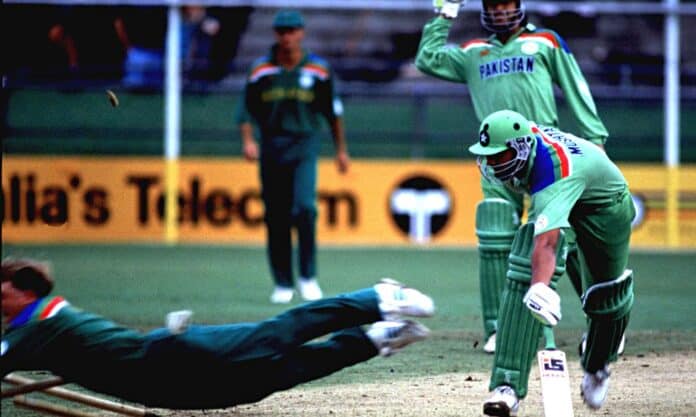To celebrate 40 years of the Cricket World Cup, ahead of its 11th edition in Australia and New Zealand, we explore some of the most memorable moments in the tournament’s history

KALLICHARRAN DESTROYS LILLEE (THE OVAL, 1975)
In the very first World Cup, the mighty West Indies restricted Australia to just 191, which they would be required to chase down in 60 overs. This was never going to be a difficult chase, but it was made even easier when the diminutive West Indian Alvin Kallicharran, blasted Dennis Lillee to all parts of The Oval, with Lillee’s last ten balls to Kallicharran costing him 35 runs: 4, 4, 4, 4, 4, 1, 4, 6, 0 and 4. Kallicharran, who stood at just 1.64m, was named Man of the Match for his 78 off 83 balls.

O’BRIEN STUNS ENGLAND (BANGALORE, 2011)
At 5-111, chasing England’s mammoth 327, you would have bet your house, car and family members on England winning their group match against cricketing “minnows” Ireland.
Enter Kevin O’Brien.
The hulking Irishman blasted 6 sixes and 13 fours on his way to the fastest-ever World Cup century, his 113 off just 63 balls providing the foundation for a nervy 3-wicket win. There’s no doubt that Ireland’s most famous victory was made just that little bit sweeter because of the opponent against whom it came.

GILCHRIST BLASTS THE OPPOSITION (BARBADOS, 2007)
A squash ball in the glove might sound like a pointless experiment, but it was this very experiment that led to one of the most breathtaking World Cup innings ever seen. In a rain-reduced World Cup final against Sri Lanka, Australian opener Adam Gilchrist blasted 149 off just 104 balls, carrying the Australians to 281 at a sensational 7.39 runs per over. The Sri Lankans never recovered from Gilchrist’s 8 sixes and 13 fours, and Australia claimed their third World Cup in a row, albeit in farcically dark conditions.

AKRAM’S ALL-ROUND MASTERCLASS (MELBOURNE, 1992)
In the 1992 World Cup final against England, Imran Khan and Javed Miandad had laid a solid foundation, but the innings still needed impetus when Wasim Akram came to the crease at 197-4. Akram and Inzamam-ul-Haq added 52 runs in 6 overs, largely due to Akram’s belligerent 33 from just 18 balls, in an era where a strike rate of 100 was exceedingly uncommon.
If that wasn’t enough, Akram later picked up two wickets in as many balls at a crucial juncture, derailing the chase and finishing with figures of 3-49 in a masterful display of reverse-swing bowling.

KAPIL DEV RESCUES INDIA FROM THE BRINK (TUNBRIDGE WELLS, 1983)
Indian all-rounder Kapil Dev was only 24 when he starred in India’s victorious 1983 World Cup campaign. India’s journey appeared to be doomed when Dev walked in with his side 9-4, and later 17-5 against the World Cup debutants Zimbabwe. Dev countered with a marvellously controlled, and eventually explosive innings, scoring 175 out of 266 in an innings where no other batsman crossed 25. He later bowled a tight spell to help India restrict Zimbabwe to 235, saving India the red faces and jumpstarting their ultimately successful tournament.

SUPERMAN JONTY (BRISBANE, 1992)
If you had to nominate a batsman most likely to be run-out, you would look no further than Pakistan’s Inzamam-ul-Haq. And in the 1990s, if you wanted a fielder to run said batsman out, you would always pick Jonty Rhodes.
In Brisbane at the 1992 World Cup, Pakistan were chasing 194 in 36 overs, and were comfortable at 135/2 with Inzamam and Imran Khan at the crease. However, a typical Inzy moment of madness saw Jonty Rhodes going airborne with the ball and throwing his entire body at the stumps, taking the wickets – and Inzamam – out of the ground. Pakistan ended up losing the match, but winning the World Cup.

SOUTH AFRICA SELF-DESTRUCTS (EDGBASTON, 1999)
Set only 214 to win by Australia, Lance Klusener’s explosive 31 from 14 balls had all but sealed the game for the Proteas, levelling the scores at 213 in the final over. However, with two balls still left, Klusener and Allan Donald had a disastrous mix-up, both batsmen ending up at the non-striker’s end. The rampant Australians in canary yellow ripped up the stumps, and went through to the final based on their superior net run rate.
The worst part? This came just four days after Herschelle Gibbs famously dropped Australian captain Steve Waugh, who went on to make an unbeaten 120*.




